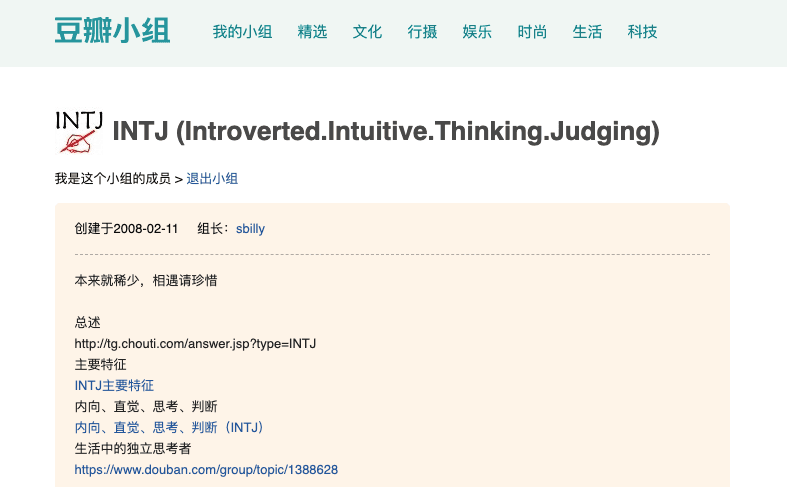
INTJ is one of the types in the MBTI personality test, representing introversion, intuition, thinking, and judging.
I took this test during my college years, and several years later, I took the same test again with the same questions. I am still an INTJ, which indicates that I am a relatively stable INTJ, and my personality hasn't changed much over time.
The description of this type generally aligns with my self-perception, so I agree with it in this aspect. I have posted my personality type in the "About" section of my blog a long time ago. Compared to adjectives describing myself as being unsociable and enjoying logical thinking, this personality type is more intuitive.
The following explains why I think it makes sense.
MBTI is a test that requires the test-taker to answer several questions and then categorizes them based on their preferred answers:
- How they focus their attention or where their energy comes from (extraversion or introversion)
- How they take in information (sensing or intuition)
- How they make decisions (feeling or thinking)
- How they deal with the outside world (judging or perceiving)
INTJ corresponds to:
- I - Introversion over extraversion. INTJs tend to be quiet and reserved. They usually prefer to socialize with a small number of close friends rather than casual acquaintances. Socializing drains their energy (while it energizes extraverts).
- N - Intuition over sensing. INTJs are better at abstract concepts rather than concrete details. They focus more on the big picture rather than the specifics and are more concerned with future possibilities than present realities.
- T - Thinking over feeling. INTJs generally value objective standards over personal preferences or emotions. When making decisions, they usually rely more on logic rather than considering social conventions.
- J - Judging over perceiving. INTJs tend to understand and approach the world in a structured and systematic manner, living in an organized and orderly way rather than always being open to opportunities and adapting to situations.
This correspondence is consistent with my understanding, and there are some descriptions that also fit my personality well:
Analytical... Most at ease when working alone... Traits of INTJs include independence in thinking and a desire for efficiency... They often suppress strong emotions and dislike wasting time on what they consider illogical social conventions... Not good at expressing emotional reactions... They may consider conversations like small talk to be a waste of time.
However, there are also many descriptions that do not match my own personality well:
INTJs are always ready to become leaders... They are a strong group of individuals... In terms of love, INTJs tend to seek people with similar personality traits and ideas... Their interpersonal relationships usually perform better in work than in leisure.
In recent days, MBTI tests suddenly became popular, and whenever we meet someone, we are asked about our personality type and then compared. Actually, regularly testing our own personality preferences and understanding ourselves is a good behavior, but what is speechless is that some tests always like to assign people to positions, in other words, labeling them, which I do not agree with.
For example, based on personality preferences, further assigning a corresponding position to a person: architect, commander, advocate, manager, entrepreneur... Isn't it awkward?
I think this is unnecessary, just like tasting a table full of dishes, calling the spicy one Hunan cuisine, the sweet one Hangzhou cuisine, and the numbing one Sichuan cuisine. It is enough to come up with a description of a dish, why bother with a summary? Does spicy food always have to be Hunan cuisine? Not necessarily. Similarly, does INTJ always have to be a commander? Not necessarily.